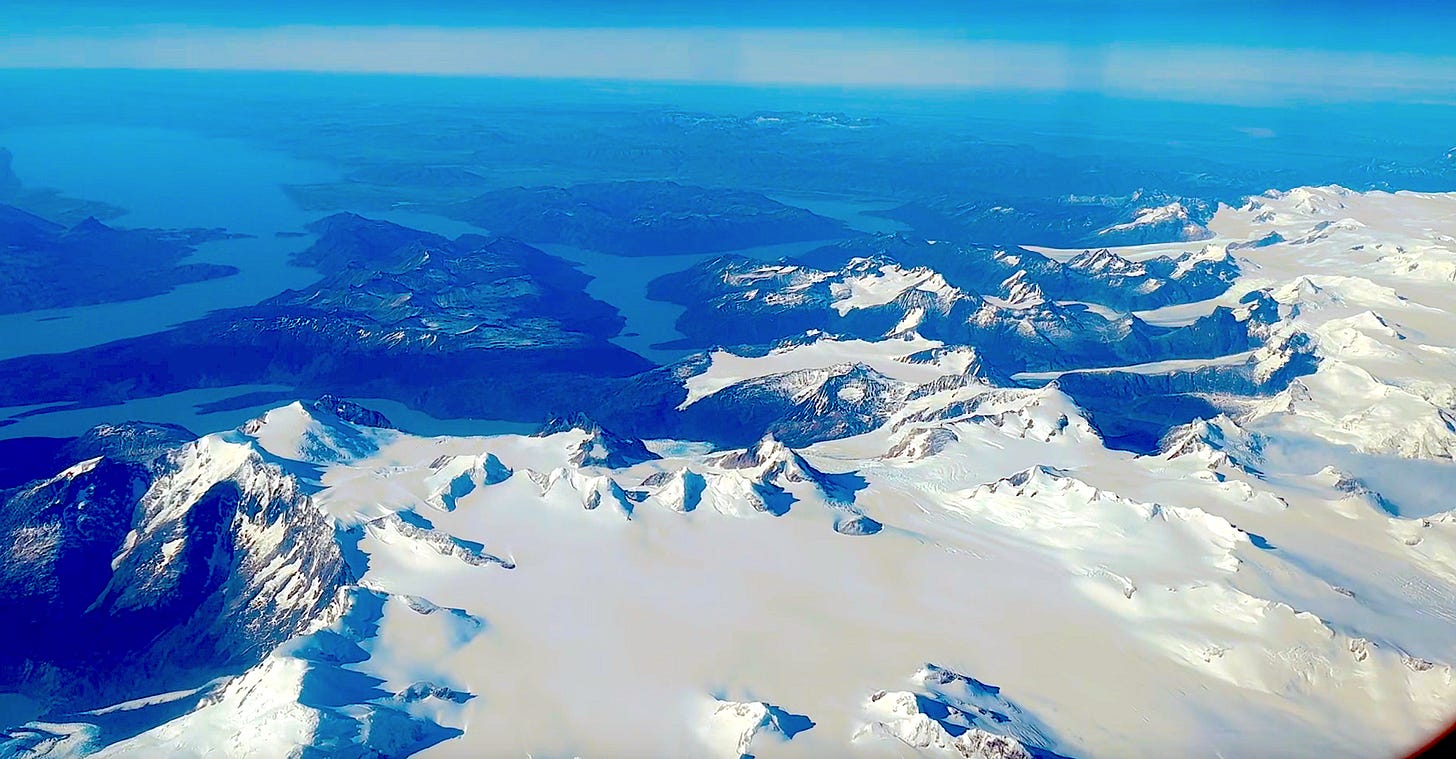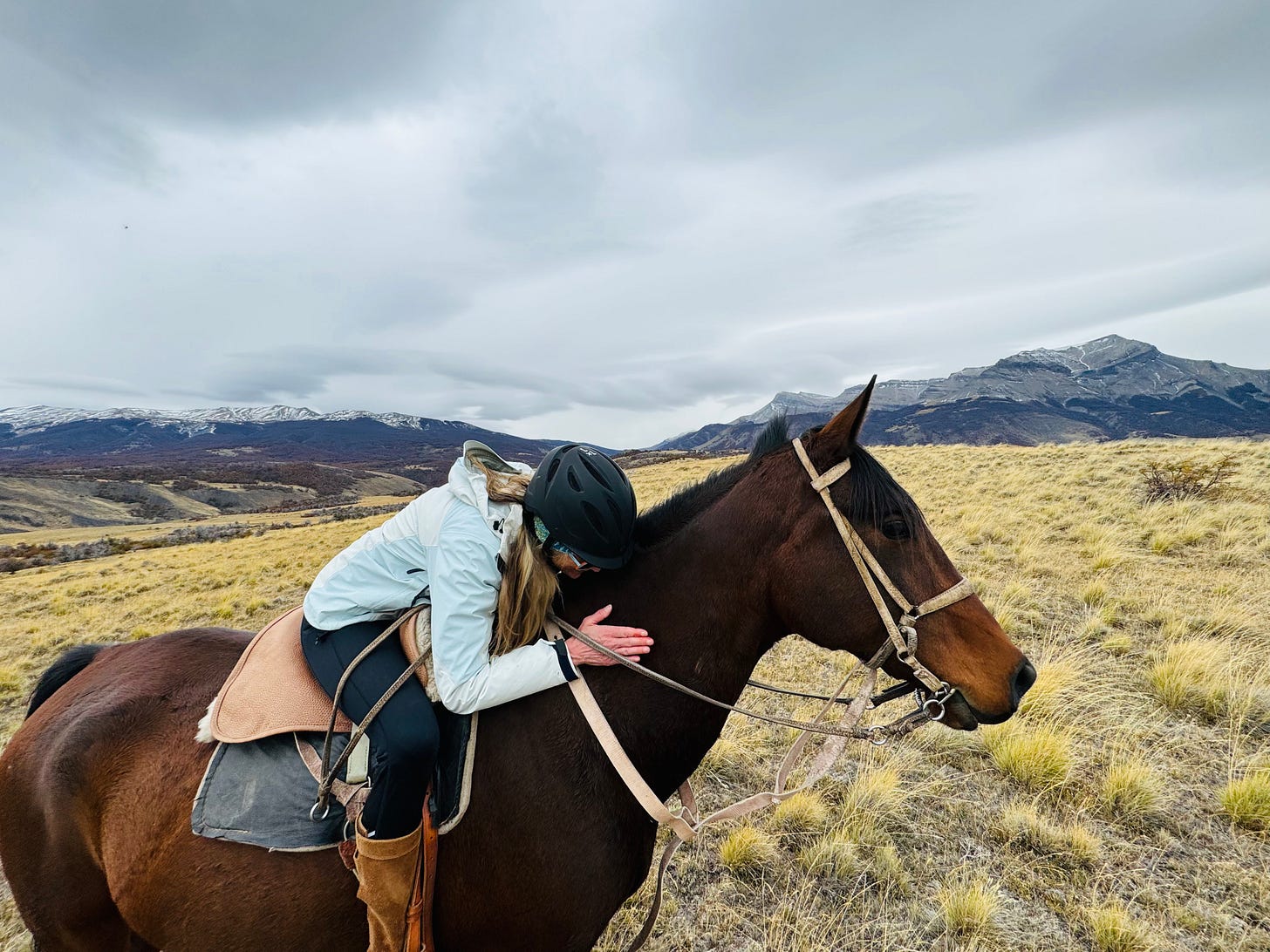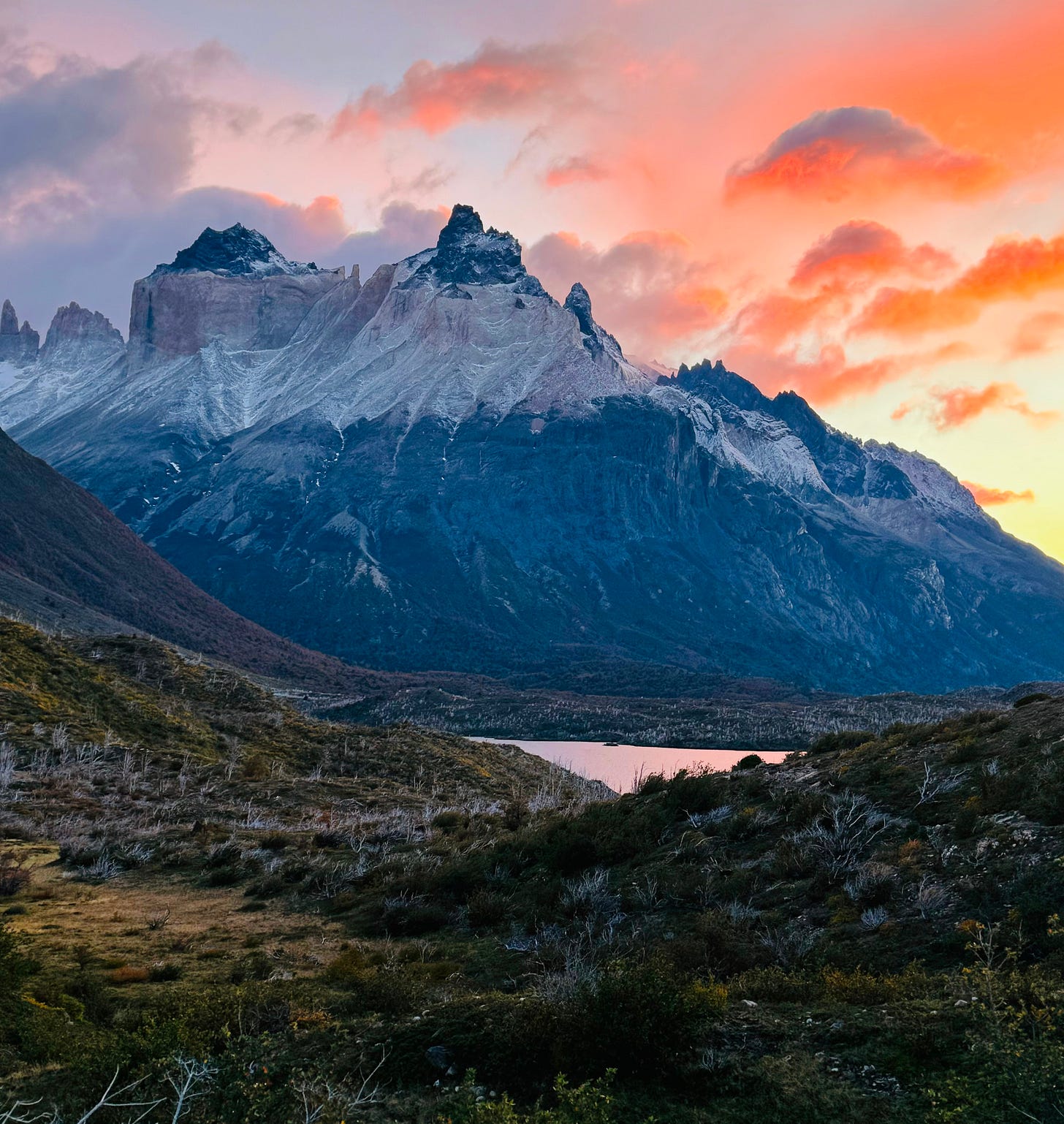When I step onto a Patagonia shoreline in southern Argentina—so remote that it’s accessible only by boat—I’m aware of nothing but the wind. I cross my arms over five inadequate layers and fold at the waist, instinctively trying to make myself more aerodynamic. “Stripping men to the raw” was how In Patagonia author Bruce Chatwin described it. Weeks into my soul-searching solo quest, I definitely feel stripped. But in none of the fun ways.
A pleasant young man named Hugo greets me, and we begin chatting in Spanish. “You’re the last guest before we shut down for the season!”
Apparently, I’m also the last to know this important detail.
I assumed the end of the season meant fewer people, better deals, and the usual service before the small estancia, or ranch, began to close down operations. Yet I soon discover that only two more boats will return to civilization—for months—and I’ll be on the final departure with all the staff…and booze. To prepare, they’ve begun dismantling the heaters and packing up everything liquid or perishable.
The Argentine cowboys, called gauchos, are rounding up the dozens of horses they use for trail rides to remove their shoes, which cause the animals to slip on river rocks. The cowboys will then release the horses to fend for themselves for half the year in punishing weather.
How it began
An eerie feeling of isolation has taken hold. It started hours earlier, during a long boat ride across inhospitable, glacier-strewn waters, leaving me hollow and seasick. Actually, it began months ago, when I was seized with a restlessness that didn’t point me in a distinct direction, but made it clear that my current emotional state wasn’t it. This followed pivotal events that occurred over time, but now seemed to pile up like a symbolic, slow-motion train wreck. They included the deaths of my parents, the loss of my marriages (yes, plural…but that’s another story), the launch of my children, an unexpected job shift, and a random accident that required surgery and a slow recovery.
Junctures like these are nearly universal. After years of feeling as if we’ve worked to take care of everyone and everything, many of us emerge with an unspoken, if periodic, yearning. For what? Freedom? Intimacy and understanding? Or perhaps anything that makes us more interested, interesting, alive?
Patagonia seemed like the right place to explore the apprehension and self-doubt settling over me like a veneer of dust. Strength and courage, integral to my life as a journalist, athlete, and travel writer, were in short supply. Going alone, which I’d always done with confidence, suddenly felt uncomfortable. But that, I realized when tempted to lure a travel partner, was the point.
My research drew me to this roughly 402,000-square-mile-region across two countries precisely because it’s imprecise, difficult, and somewhat mysterious. These qualities mirrored how I felt, and carried the vague promise of insight. Then again, I reminded myself, design and analysis have limits in certain situations. I’ve competed in eight full Ironman triathlon races, including five through the lava fields of Kona, Hawaii, and not one has unfolded according to “plan.”
Last days with the condors
“You’re the last guest!” Hugo repeats. “It’s the end of the season!” What does it mean to be on the cusp of winter in South America, so far off the grid that you can’t find your way back without help and multiple modes of transportation that have already become much less available?
I learned a little during the previous weeks on the Chilean side of Patagonia when I asked locals about forecasts. They would tilt their heads and nod politely, then explain that predictions “don’t really work around here.” One moment, the weather may invite you to hike in a T-shirt. The next, you’re sure it will lift a building from its foundation.
Last. The single syllable elicits emotions, Biblical passages, and paintings depicting themes of failure, betrayal, isolation, and death. Not exactly a vacation vibe.
An off-road vehicle takes us from the dock to the lodge. It tosses me around in my seat, for which there’s no safety belt, forcing me to brace against the frame with both hands. As we crest the hill, the valley unfurls before us—vast, untamed. In the distance, beyond the patchwork of tans and browns, loom snow-covered peaks.
We begin unloading at a modest structure in the shape of an octagon. I smell a wood-burning fire and, more faintly, horses. Circling directly overhead are five Andean condors, each with a wingspan that can exceed ten feet. The wind works for them. These massive black vultures soar and study and wait. It’s breathtaking. And ominous.
“They’re just interested,” Hugo reports as I stare.
Speaking of last suppers.
On Stephen King (and writing)
When we enter the small building, my neck tingles. According to lore (or maybe effective marketing) Stephen King and his wife were the last guests at the Stanley Hotel before winter closure in 1974—the visit that inspired The Shining.
But Mr. King has nothing on me right now. He was in Colorado…with his wife!
I receive instructions in Spanish. Alone. The essential takeaway: never go anywhere without telling someone. There is no cell service. I’m talking…zero bars. Advice for anyone who might get seriously hurt or sick? Don’t. Electricity comes from a generator, which shuts down for eight hours overnight. Supposedly, Wi-Fi works in one narrow spot in the lodge area. But that, I will discover when I really need it, is largely theoretical.
“There’s nobody else here?” I ask as we wrap the safety briefing.
“Well, there’s one family. But they leave a day ahead of you. So you’re the last!”
A total of twenty guest rooms are scattered across the property in five different casas, or small houses. Established as a sheep ranch in the early twentieth century, the estancia shifted from wool production to hospitality decades ago. Considered a high-end guest experience, I can see that it would be idyllic in normal circumstances.
Another problem: I’ve arrived exhausted and fighting a cough. Two weeks earlier, I landed in the Atacama Desert in Northern Chile, at an elevation of 8,000 feet, feeling fit and hopeful as I mountain biked and hiked my way through the arid, other-worldly landscape brushed with red hues. I wrote thoughtful journal entries and declared in my first video log: “I am aWAKE!” in the spirit of Walter White’s rebirth in Breaking Bad. And I was. I had prepared. I made new friends and the most of every moment.
As I shifted to the second stage of my trek—Torres del Paine in southern Chile—my energy remained high and my journal entries still had that ballsy edge.
Now, a few days later, my journal amounts to elementary phrases in the Notes section of my phone under the headline: “Fuckups.”
Gauchos, horses, and everyday miraculous simplicity
A horseback ride in fresh air sounds like a good reset and possible cure for my lingering seasickness. Outside the austere stable, I meet Vicente, a quiet, handsome man who has worked as a gaucho for most of his life, though I can’t possibly guess his age. He wears the traditional attire that dates back to the early 1800s in Argentina—knee-high boots, an oversized beret worn by nomadic tribes, a distinct style of trouser called bombachas, and a poncho.
The aroma of leather mixed with manure pierces my stuffed nose. I add chaps over my ski pants, a helmet over my beanie, and mount a horse with a Chilean saddle that rises sharply in the back to aid with the hilly terrain.
I have experience with English, Western, and bareback. But a few days earlier, after cantering through the rugged countryside, the Chilean saddle left me feeling like I’d just given birth. Thankfully, the pace is easier today. My horse is sassy—with a name that includes loco, of course he is—but he tests me only a little.
Still, I remind myself, a Criollo is not a bored plodder trained for resort trail rides. Not only are they released for the winter, the gauchos let them loose and round them up on a rotational basis each week. Historically, they were bred to cover great distances in harsh conditions with little food. You can feel the coiled energy. Get yourself ahead of the gaucho on the way back to the stable and you will have a situation, no matter what your level of expertise, that you won’t control.
Soon we pass two bulls who give us side eye. One snorts, then moves along a parallel path, flaunting his big horns. They seem…close. I ask Vicente if there’s anything to be concerned about.
“They’re just interested,” he says with a shrug. I feel like I’ve heard this before.
When the howling winds don’t whisk away our words, Vicente tells me that his desire to escape the commotion of Buenos Aires brought him to this remote place. When I later ask if he could Airdrop photos (if such a task is possible here), he looks at me skeptically and says, “I don’t have that.”
I contemplate an existence stripped of everything but this moment in my physical surroundings. No television. No internet. No cell service. No social media or news of wars and politics. No restaurants or stores. A “disconnected” life where nothing is more important than the person in front of you, where nobody breaks eye contact for a screen, or dismisses an idea or another human being with a swipe. Where we all engage in what poet David Whyte calls “the everyday miraculous simplicity of spending time together.”
Perhaps this is why Vicente’s presence is so calming. He’s all here.
Overhead, the condors appear again. For a while, I can’t pull my gaze from their cool control, the way you can’t look away from a charismatic person who commands a stage with little effort. The ring of flight continues. But a quick scan for a carcass reveals nothing but my own vulnerability.
Like Vicente, I also needed to find stillness away from a big city. In Los Angeles, the tumult of sirens and horns, the fact that I can run ten miles faster than it takes me to drive the same distance, seemed inescapable. But now the silence threatens to swallow me—an uneasy yet essential step in the tangled process of rediscovering myself.
We weave through prickly trees that I guess are Southern Beech, wander open plains littered with basalt, and cross the river again. When we circle back, I realize that we’ve been moving with the wind. I gasp and yank up the balaclava. Even with the protection of sport sunglasses, I can barely see through watering eyes soaking my cheeks.
Steve, Cecilia, and Outkast
At the end of the ride, I spot the penultimate guests (better than second-to-last?). My heart flutters as I jog back to the lodge, where I introduce myself to Steve and Cecilia, business owners from…New Jersey! Their congenial presence is like a surprise bouquet of flowers as we settle onto the half-moon couch. They’ve just finished a hike with their college-age son, who completed a semester abroad in Buenos Aires.
We look around. Four staff members chat behind the bar a few feet away, but are busy loading boxes and ignore us. Steve, a polite and fit executive, requests three glasses of Mendoza wine (when in Rome) and a snack. The only option: semi-stale mixed nuts scooped from a bin and served in an overflowing cereal bowl.
They are surprised to learn of the imminent shut down. Cecilia—slim and smart in her Lululemon ensemble—crosses her legs and watches the movements of the staff, crinkling her brow. “They’ve already started.” Her New Jersey accent drives home the point. “They’re moving out. It makes me uncomfortable.”
When we hear that a barbecue is planned for us near the stables, we wonder aloud: Is this to get us out of the way so they can pack?
We leave to clean up for dinner and find ourselves assigned to rooms in one casa. Soon we bump into each other with awkward amusement in the cramped space behind the same second door. With the entire resort available, we share a wall in one small corner, packaged as a family.
At this point, maybe we are.
The barn-like structure where we’ll eat dinner is rustic in a way that might feel more authentic with fifty people instead of five, and maybe some traditional Argentine music. But tonight, Outkast echoes through the chilly desolation: Don’t want to meet your daddy. Just want you in my caddy. Hey ya!
At one table, I find three placemats for Steve, Cecilia, and their son. At another is a setting for me, facing the opposite direction. I’m comfortable eating out alone, but this is downright pitiful. Steve grabs my placement and utensils. “I didn’t want to be presumptuous,” he says, “but you’re sitting with us.”
We’re definitely family now.
Gratefully, I help move tables and shuffle seats. Too close to the wood burning stove and we all break into a sweat. Too far, and we shiver. We load up on cheese and bread. Soon the medley of meats begins to arrive.
The centerpiece is guanaco, a “South American camelid related to the llama and alpaca,” according to Britannica. Unappealing under most circumstances, this serving is on the bloody side of raw. We wince and request more time on the grill. When it returns, I put some muscle into my knife, then chew. Gamey is an understatement.
Sausages appear, peppered white with fat. The server brings us a bottle of wine. We drink.
Then I notice something else covering the meat: a muted coat of…soot? Whatever it is, I taste it, too. I look around to see if anyone else is eating. That’s when I catch Steve hiding the food like a child. Our eyes lock. He knows I know. He shakes his head and holds up a paper napkin the size of a softball. “I can’t fucking eat this!” he announces in a stage whisper. After an Old Fashioned, or two, and some wine, Steve is a lot less formal. Not that I’m counting. Or judging.
He glances around for any sign of our server, stands up, opens the wood burning stove, and hurls his napkin and food. The fire reacts with a poof, sending Steve back a step. He throws up his hands. “I can’t! It’s awful!”
The server sets down another bottle of wine with a clunk, and leaves. Nobody eats. Everyone drinks. Nothing matters anymore, because we’re having a marvelous time.
Back at our cozy casa, Steve and Cecilia help me check the heat, emergency lights, supply of blankets. “You have to be ready!” he exclaims.
Pleasantly relaxed in that moderately overserved sort of way, I say goodnight, slip into sweats and wool socks, tumble into bed, and immediately fall asleep.
Around three in the morning, nausea rolls through me like a freight train. I run to the bathroom and spend the next few hours in a most unfortunate redistribution situation. My room is dark and cold as hell. I imagine sending my children a message apologizing for my choices, reminding them of the file labeled “For you, when I die.”
When it’s light enough, I use what little strength I have to bundle up and shuffle to the lodge to tell the staff that I can’t do the six-mile hike to the glacier, since this one-minute stroll has left me breathless. I attempt mangled Spanish and descend to third-grade English. My brain doesn’t work. They are helpful and kind, offering soup and reminding me of the rudimentary speaker system in the casa, in case of emergencies. But I’d forgotten.
My cough has become deep and raspy, as has my voice. I’m dehydrated and defeated. Last time I felt like this, I ended up with pneumonia.
The whole affair starts to conjure thoughts of Odysseus. What was painted (to me, by me, obviously) as a bold journey of discovery now seems ridiculous and self-indulgent. In the end, might our protagonist have done well to…stay home and see a therapist?
Once in the lodge, I move around to find the magic spot with Wi-Fi. But my phone is lifeless. Eventually, I manage a one-message exchange with my doctor via WhatsApp. She instructs me to get home. Many hours and dollars later, the limited flights are rebooked in a virtual house of tickets. One delay and it all falls apart.
A humble conquering
Several hurdles threaten the fragile choreography, but forty-five hours after I climbed into the Jeep to leave the ranch, I ease into the ultimate luxury: my own bed. As my head sinks into the pillow, a mower roars to life outside. A horn blares. Then sirens.
But no condors.
When I finally shake the lung infection, I feel nothing but gratitude for the broad sky and jagged peaks of that magnificent horizon, both literal and metaphorical. For the stories that continue to make me laugh at myself. And for the humility and fulfillment that come from venturing into the unknown—even (or perhaps especially) when things go a little sideways.
Enlightenment remains elusive. But this has given me something more attainable. Something more accepting and healing.
And that insidious angst? It’s completely gone…leaving nothing but possibilities.












Wow so honest and beautiful and funny and real. Appreciate you. I read it first then listened.
I so enjoyed hearing you tell this story!